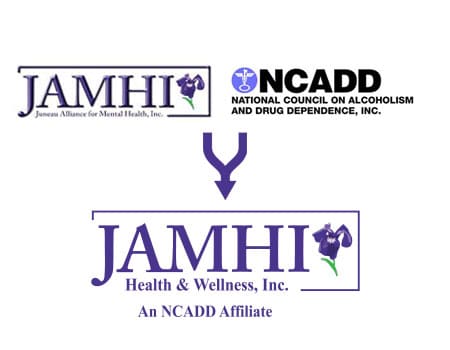Established in 1985 as Juneau Alliance for the Mentally Ill, (JAMI) was originally organized as a family-based, grass-roots advocacy organization providing some supports to adults with severe chronic mental illness but also family support, information and referral, education and assertive stigma reduction. Read more below, learn about our merger history as well, and enjoy some photos from the past.
OUR HISTORY
In the early 1990’s JAMI DBA JAMI/NAMI began providing general mental health and emergency services; in 2000 became the state designated community behavioral health center for Juneau, Gustavus, Elfin Cove and Tenakee Springs; in 2002 renaming to JAMHI: Juneau Alliance for Mental Health, Inc.
The JAMHI service array continued to grow beyond residential and basic services through the 2000s with a heightened focus on serving people with co-occurring disorders, the implementation of evidence-based practices, expansion of medical and drop-in services, development of same-day access capacity and the organization was accredited in 2011.
JAMHI received a SAMHSA Primary Behavioral Health Care Integration grant and began providing primary care services in 2015 and expanded its focus to whole person wellness with a Dartmouth InShape grant.
Established in 1965, NCADD-J organized the first Governor’s Conference on Alcoholism and with the State Council of Churches, and helped convince the legislature to form a State Council on Alcoholism.
In 1967, we worked with the Salvation Army to establish the first Juneau half-way house for people with alcoholism.
Through the late 70’s, 80’s and 90’s JAMHI provided employee assistance program (EAP) services to a variety of Juneau employers. And in 1980 we began the Alcohol Information School which later became Alcohol and Drug Information School (ADIS).
Through the 80’s and 90’s NCADD-J received a variety of grants and subcontracts to support coordinated substance use prevention services.
In the early 2000’s, the organization piloted the first Juneau Wellness Court. In 2001 the adult ASAP program and Adolescent Assessment and Referral (AAR) program combined into one state-funded JASAP program.
In FY ’13 and ’14, we grew to provide behavioral health clinical and rehabilitation services, reimbursed with Medicaid funds and established the Juneau Reentry Coalition, and became accredited in 2015.
MERGER INFORMATION

On January 16, 2018 the board of directors of a newly merged entity, JAMHI Health and Wellness, Inc., met for their first meeting. They approved new Articles of Incorporation and Bylaws, establishing a new mission of ‘Helping people live their own best lives’, thereby positioning the organization to serve the community more effectively and comprehensively than ever before. The organization is CARF accredited for governance as well as for the following direct service programs:
- Case Management/Service Coordination: Integrated alcohol and other drugs/Mental health for adults
- Community Housing: Integrated alcohol and other drugs/Mental health for adults
- Crisis Intervention: Integrated alcohol and other drugs/Mental health for adults
- Integrated Behavioral Health/Primary Care: Comprehensive care for adults
- Outpatient Treatment: Integrated alcohol and other drugs/Mental Health for adults
Today in addition to the new merged service array:
- Many residents at the Juneau Housing First Collaborative’s Forget Me Not Manor are receiving JAMHI Health & Wellness integrated services and are successfully housed through our partnerships with The Glory Hole and St. Vincent DePaul Society.
- The Salmon Creek clinic is serving individuals, families, and children who need affordable primary health care service on a sliding-fee scale.
- JAMHI Health & Wellness intensive outpatient (or IOP) services for people with substance use disorders, which was initiated in November 2017, has reached capacity and a second program is being planned to meet community demand for local, high-quality, strength-based recovery services.
We at JAMHI Health and Wellness, Inc. have lots to be thankful for, and our partnerships and effective relationships with our community stakeholders top our list, as well as our most important resource – our human resource!



